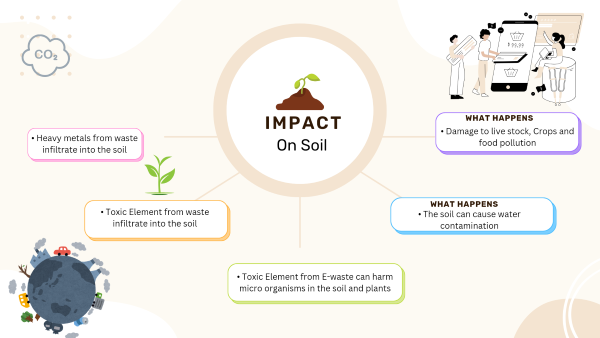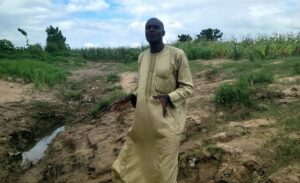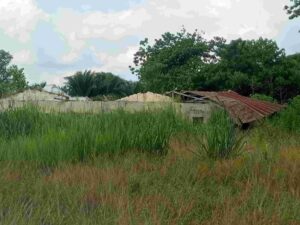In this investigation, IFECHI OBIESIE looks at the dangers of environmental pollution and health hazards to residents and traders living and trading close to a dump site in the Oke-Afa area of Lagos State, highlighting how the negligence of Lagos State Waste Management Authority heightens the situation
Dateline was the 17th of February 2024, and the time was 6:30 am.

Right there, in the heart of Oke-afa is a man-made dumpsite.
The scenery stretches out in a jumbled patchwork and dark, festering mounds of rotting food, plastic and metal piled into a growing garbage.
An oppressive odour permeated the air, a combination of chemical fumes and rotten materials that cloaked the skin and lungs with its invisibility.
At all seasons, the Mass Burial Market and dumpsite are usually an eyeful of disgraceful mounds in the megacity, but the situation usually worsens when the rains start.
During that period, it is pretty tough to walk in the market and areas close to the dump site. The grounds would then be carpeted with plantain stems by worried traders, who do not want their customers to stop coming to buy. The landscape is a picture of government neglect, festering infestations and air pollution.
Our reporter found out from a resident that this dumpsite has been in existence for over 10 years, and that residents are used to the dirt, fumes, and stench.
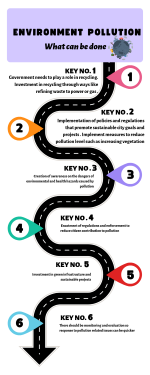
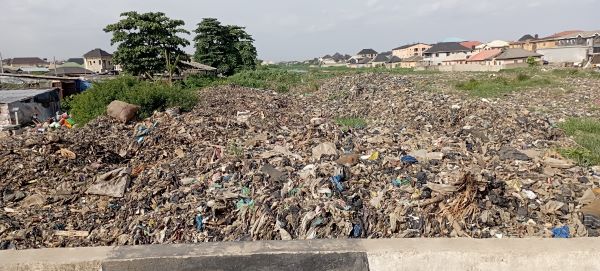
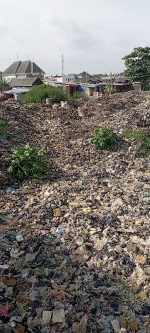
Our reporter watched as a local trash collector otherwise known as kolekole, dragged a 50kg sack, making a beeline for the site,further contributing to the growing mound.
He is one of several people dumping refuse and other waste at the site.
This reporter went into the dumpsite and discovered that it was crawling with scavengers, cart pushers and trash collectors.
Many communities and Lagos citizens continue to live close to this dumpsite and other dumpsites in that area.
Our reporter gathered that several complaints had been made by most of the residents, but the latest angry complaint is about the newly constructed Oba Osolo International Market, built on a carefully cleared area of the dump site.
The new market amid the dirt, fumes and stench is a pointer that the Lagos State Government is aware of the environmental situation of Oke-Afa.
The proximity of the fresh food markets and residential areas to the dump site is a growing concern of residents, who often worry about health hazards.
According to a Professor of Public Health, Tanimola Akande,University of Ilorin, Kwara State, Nigeria, such an environment poses health threats to those exposed to it.
According to World Health Organisation, an estimated 12.6 million people died as a result of living or working in an unhealthy environment in 2012 – nearly 1 in 4 of total global deaths, according to new estimates from WHO.
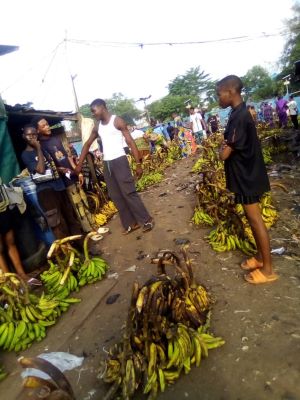
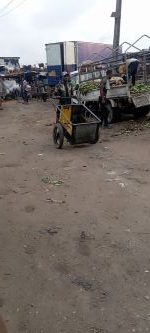
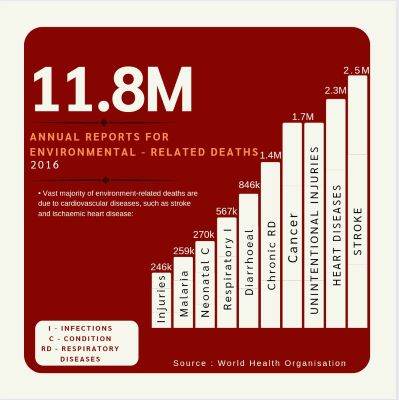
It further states that “environmental risk factors, such as air, water and soil pollution, chemical exposures, climate change, and ultraviolet radiation, contribute to more than 100 diseases and injuries.”
Noncommunicable diseases (NCDs) such as stroke, heart disease, cancers and chronic respiratory disease, now amount to nearly two-thirds of the total deaths caused by unhealthy environments, WHO said.
The Ikoyi-Obalende Local Council Development Area (LCDA) states that the Local Government Council Environmental Department was tasked to promote amongst other things, public health through enlightenment, enforcement of environmental laws, house-to-house inspection, refuse control, waste management and food control and inspection.
It is also expected to handle issues relating to environmental sanitation, health education, flood abatement, enforcement of environmental sanitation and public health laws, market sanitation, pest control, and pollution control, amongst others.
However, Ejigbo LCDA has failed in all ramifications to meet and adhere to its functions and duties, judging from the siting of the fruit market and the current siting of the new market amid dumpsite oozing sickening stench, birthing flies, and mosquitoes.
Amid the dumpsite, scavengers and cart pushers have made it a ground for building residential homes. It has a bustling underground market, restaurant, drugstore, and worship centre. This site also served as a storage house for plastic waste. A truck filled with a collection of neatly packed plastic waste was sighted by our reporter.
There is also a meat market close to the dumpsite, all contributing to the unbearable stench that permeates the area. Wheelbarrow pushers, who carry fruits and other edible items for traders and customers are seen carelessly leaving these wheelbarrows at the dumpsites.
Aside from regular waste, the dumpsite houses E-waste which is said to be one of the fastest-growing solid waste streams in the world.
According to WHO: “E-waste contains multiple known and suspected neurotoxicants, including lead and mercury, that may disrupt the development of the central nervous system during pregnancy, infancy, childhood and adolescence. Some harmful toxicants from e-waste may also impact the structural development and function of the lungs.”
WHO explained that many bad practices observed at E-waste sites are scavenging, dumping on land or in water bodies, landfilling along with regular waste, opening burning or heating, acid baths or acid leaching, stripping and shredding plastic coatings, manual disassembly of equipment.
“These activities are considered hazardous to the environment and human health as they release toxic pollutants, contaminating the air, soil, dust, and water at recycling sites and in neighbouring communities,” it further states.
A report by Dr Livinus I. Nwokike of Justice of Peace, Notary Public and Lecturer, Department of International Law and Jurisprudence, Faculty of Law, Nnamdi Azikiwe University, Awka, Anambra, Nigeria, titled, ‘Lagos Waste Management Authority Law 2007 And National Environmental Standards And Regulations Enforcement Agency (Establishment) Act 2007: A Comparative Appraisal,’ noted that the Lagos State government, to effectively manage waste control, came up with the enactment of LAWMA Law.
Premiumtimesng.com, a Nigerian news online platform mentioned that Lagos is faced with a major difficulty in handling the growing amount of trash generated by its burgeoning population as it rapidly expands its resident population.
Waste as defined by the Environmental Protection and Management Law 2017 is controlled waste, which includes solid, liquid, gaseous, or sludge waste which because of its chemical reactivity, environmental or human hazardousness, infectiousness, explosiveness and toxicity is harmful to human health, life or environment.
Despite existing Laws, LAWMA is still failing in its duties.
On the day our reporter visited the fruit market, she spoke with Joy Austin, a buyer who came to the market, and bitterly complained about the exploitation and extortion of buyers, which is termed as ‘Owo ile.’
She then complained about the terrible situation of the market.
She said: “During the rainy season, the environment is even worse than what you are seeing today! The ground starts sinking and plantain stems have to be spread on the sinking, muddy ground for sellers and buyers to place their feet.
“You know in Nigeria; we believe that dirt doesn’t kill. Like me, I have eaten in this place before, unmindful of the environment because I was very hungry. Those of us who frequent that market at the dumpsite have become used to the dirty environment, the fumes and the stench.”
A resident in the area, Oluchi Miracle said: “Some people built shanties on top of the mound-dirt that is being disposed there. The other day, I saw a pregnant lady coming out from one of those shanties and I was shocked. I wondered how people could live right inside such an environment when those living not too far from it are complaining.”
Even as the health threats mentioned by WHO above continue to resonate, it was observed that children are not left out in the ominous danger as many are in these communities.
The Sustainable Development Goals of the UN state its targets to substantially reduce the number of deaths and illnesses from hazardous chemicals and air, water and soil pollution and contamination by 2030 and end preventable deaths of newborns and children under five years of age.
WHO said that children and pregnant women are at higher risk than adults of contamination released through informal E-waste recycling activities due to their unique vulnerabilities.
Despite existing laws, LAWMA is still failing in its duties
No doubt that cart pushers and trash collectors are contributors to the environmental menace in the area, however, the root problem is the dereliction of duty by the Lagos State Waste Management Authority (LAWMA).
Ruth Adenike is a resident of Bucknor Estate, which is one of the estates close to mass burial site.
She complained that LAWMA officials were last sighted in her community over two years ago.
Her words:“Before they eventually stopped coming, their visits had been irregular. They would collect money from us and would not render the services we paid for. They would collect money and disappear for five to six weeks, then reappear.”
The Resident Monitoring Officer of Ejigbo LCDA, Ogunlana Olasheni, said that LAWMA officials were supposed to go to communities to pick up trash at least once a week.
The functions of the LAWMA authority, according to Nwokike are to collect and dispose of domestic, commercial and industrial waste; prepare and update from time to time the master plan for waste disposal in the state, and cities, control resultant waste systems within the state; approve and monitor all waste disposal systems in the state, make provisions for waste management services to state agencies.
Nwokike further stated that the authority may carry out its functions in association with any other person or body lawfully empowered to do so, in accordance with the provision of this law 4 (1) (a)-(h) and (2).
Private Sector Partnership (PSP)in Waste Collection and Transportation has been in existence since 1997 under the Ministry of Environment.
A new management team was appointed for LAWMA in May 2005 with a mandate to rid the City of filths and bring about improvement in the delivery of solid waste services to the citizens of Lagos.
Its target is to ensure a clean environment, free flow of drainage water, reduce incidents of flooding, and reduce cart pushing activities and indiscriminate dumping.
Adenike showed our reporter a detailed collection of receipts to back up her claims that LAWMA last visited the community two years ago.
Adenike’s complaint is in sync with the statement of Engineer Paul Okeke, the community leader of Bucknor Estate.
Okeke complained that LAWMA trucks coming to the community used to work effectively when it started, but the story soon changed after PSP took over their services.
He said: “After the change, they were inconsistent and then finally stopped coming. I made efforts to reach them. I called and they said they were based in Gbagada. We asked for a meeting, but they never showed up. They did not even reach out to me or any executive to tell us why they stopped coming.”
A store owner in the community, Faith Uduma, said that PSP Operators only come to pick up the trash along walkways on the highway.
Our reporter’s finding showed that the PSP operator in charge of Bucknor Estate is Futol Environment.
This prolonged absence of PSP in the community breaches the law and functions of the PSP. This breach forces residents to resort to self-help by paying trash collectors, who collect and then dump this indiscriminately at the dumpsites and canals.
Section 181(A and B)of the Environmental Management and Protection Law 2017 states:“It is an offence punishable with a fine of N200,000 or a jail term, to dispose of harmful waste-solid, liquid or gaseous-without the participation or permission of the agency.”
These acts by the PSP operator have also led to the illegal dumping of dirt on the sidewalks and the burning of waste-solid and e-waste by residents.
Another shortcoming of LAWMA in this area and Lagos Central 1 in general is the absence of the LAWMA Marine Waste team. The Marine waste team is in charge of clearing clogged canals and major drainage systems.
The canal in Mass Burial is full of debris that is yet to be cleared. Drainage maintenance remains a persistent challenge in Lagos. Attempts by individuals to clean the clogged drainage have been made.
However, the dirt eventually finds its way back into the drainage due to the absence of a proper disposal mechanism. Worsening the situation are street hawkers selling edible items close to the clogged channels.
Four weeks ago, this reporter reached out to the RMO of EjigboLCDA, Ogunlana Olasheni and tendered a complaint on the happenings, however, the response has been that he was working on sanctioning the operators in charge.
Unveiling the impact on the environment and populace
The dumpsite is very close to thecanal, amid a jumble of plastic, food scrapes, and other debris.
Premiumtimesng.com states that methane, which is more than 25 times more effective than carbon dioxide at trapping heat in the atmosphere, is one of the gases released by the breakdown of this waste.
According to sciencedirect.com, “chemicals that are harmful to human health and have gotten into the environment due to human activity are called environmental pollutants.”
These activities may interfere with the body’s internal functioning, causing diseases like cancer, cardiovascular, reproductive, prenatal central nervous system, and respiratory health issues.
“A person may develop asthma, bronchitis, throat infection, and a burning sensation in the eyes. Exposure to soil in which the presence of unwanted chemicals, substances higher than the normal concentration disturbs the health of living organisms. Children under three are always at high risk because they are easily exposed to soil,” it further states.
Professor Akande said: “They are exposed to chemical hazards and some of them can also be exposed to E-waste depending on the kind of waste they pack, which can be toxic to their immune system and over time it can cause cancer.”
According to him, the people living in the community, get to inhale the stench coming from the environment and are therefore exposed to respiratory infections.
He added: “A lot of burning usually occurs in these dump sites, all sorts of chemicals are burnt, they turn into gases and people inhale this gas and this can cause serious chronic respiratory diseases. Unfortunately, what we have here is that people get used to this environment. They hardly perceive the smell and that makes it dangerous!”
He said that the burning of the waste that should have been disposed exposes the environment and people living there to different chemical gases. Also, there are other biological hazards, the diseases carrying mosquitoes that the stagnant water is breeding, and rodents like rats that the dumpsite is also breeding, causing the residents a great deal of harm, said Akande.
The Executive Director, Foundations for Environmental Rights, Advocacy and Development (FENRAD), Mr Nelson Nwafor said that pollution has a serious environmental impact and health risk.
His words: “It poses a serious challenge to the health, environment, livelihood, and vulnerable people who are at risk of contracting communicable diseases that can pose serious health emergencies like respiratory sickness and cancer.
“As they’re exposed to pollutants and environmental hazards, it can compromise the well-being of the people and the residents that are there. It can compromise the quality of food sold in that market. The contaminants such as heavy metals, and industrial chemicals can accumulate in water and soil sources used for the food.”
Nwafor also stated that certain factors contribute to the reason pollution is very harmful and it includes the availability of the vulnerable population of those people that are living in those areas.
He said: “Look at women, children, pregnant women, people with disability. Government agencies and stakeholders need to take preliminary measures to address this environmental pollution and to protect the public health.”
He mentioned that the government should come up with enough regulation and enforcement mechanisms so they can reduce those pollutants.
“The dump has to be moved to another place where they can be recycled. Governments can invest in recycling instead of allowing those wastes to cause environmental hazards. Some countries are refining waste into gas or to power,” said Nwafor.
He added: “There should also be serious awareness for people living in the dump to understand the environmental and health hazard that is caused by this pollution. The government should take responsibility to ensure that it implements policies and regulations so it can promote sustainable policies.
“There should be monitoring and evaluation on the part of the government so they can respond to pollution-related issues quicker. The most critical part that the government is to play a role in is recycling; recycling is key!”
Nwafor further urged the government to implement measures to reduce pollution levels, such as increasing vegetation.
“They can also provide financial support and assistance to those businesses so they can adopt a cleaner technology, and this would encourage investment in green infrastructures and sustainable projects to achieve a safe space for all.”
This report was facilitated by the Wole Soyinka Centre for Investigative Journalism (WSCIJ) under its Collaborative Media Engagement for Development, Inclusivity and Accountability (CMEDIA) project.

